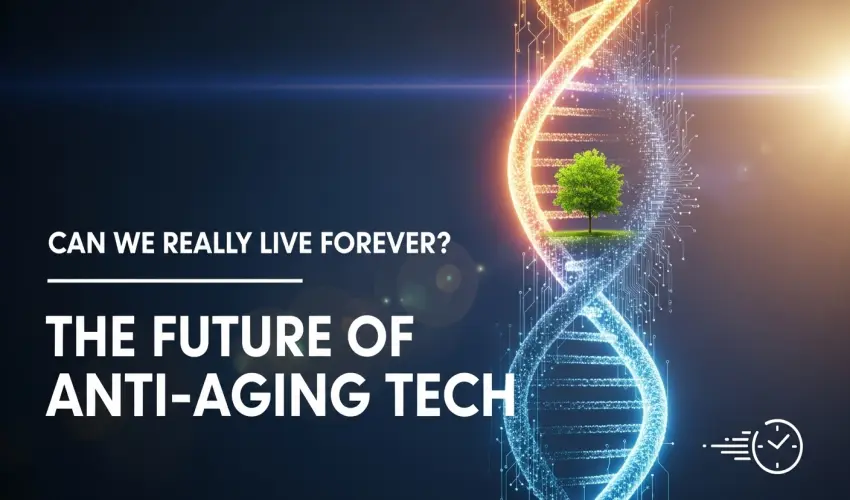Can We Really Live Forever? The Future of Anti-Aging Tech
Published Feb 28, 2025
1 0
Key Takeaways
-
Anti-aging technology is advancing rapidly, with researchers aiming to extend human lifespan and, more importantly, "healthspan."
-
Gene therapy, cellular reprogramming, senolytic drugs, and AI-driven drug discovery are leading the next wave of longevity science.
-
Companies like Altos Labs, Calico Labs, and Life Biosciences are investing billions into reversing aging at the cellular level.
-
CRISPR gene editing and stem cell therapy offer new possibilities for regenerating damaged tissues and organs.
-
Ethical, social, and economic challenges arise: Who gets access? At what cost? Should we really live forever?
-
Radical life extension may be possible this century, but true immortality remains scientifically elusive (for now).
-
The real goal of anti-aging tech today is not just living longer, but living healthier for longer.
Introduction
The quest to cheat death is as old as humanity itself. From the mythical Fountain of Youth to modern Silicon Valley labs, humans have dreamed of defeating the aging process. Today, thanks to breakthroughs in genetics, biotechnology, and artificial intelligence, scientists are closer than ever to turning that dream into a potential reality.
But can we really live forever? Or is the promise of immortality still just a fantasy? This article explores the cutting-edge technologies reshaping the future of aging, the ethical dilemmas involved, and whether a longer, or even infinite, life is truly within our reach.
1. Understanding Aging: Why Do We Grow Old?
Aging is a complex biological process characterized by several key factors:
-
Accumulated cellular damage
-
Decline in stem cell activity
-
Mitochondrial dysfunction
-
Shortening of telomeres (the protective caps on our chromosomes)
-
Chronic inflammation ("inflammaging")
Over time, these factors lead to an increased risk of diseases like cancer, heart disease, and dementia, along with a loss of physical resilience and cognitive decline. In short, aging isn’t just getting older; it’s a slow biological breakdown. If we can understand and intervene in these processes, we might be able to slow, stop, or even reverse aging itself.
2. The Anti-Aging Technologies Leading the Charge
a) Gene Therapy and Genetic Engineering
Gene therapy offers a powerful tool to combat aging by directly modifying the genetic instructions inside our cells. Some key targets include:
-
Telomerase activation: Lengthening telomeres to maintain cellular youth.
-
FOXO3 gene: A gene variant associated with extreme longevity in humans.
-
SIRT genes: A family of genes linked to DNA repair and metabolic control.
b) Cellular Reprogramming
One of the most exciting breakthroughs came from the discovery of "Yamanaka factors," a set of genes that can reprogram adult cells back into a youthful, pluripotent state. Companies like Altos Labs are trying to harness this technology to:
-
Rejuvenate aging tissues.
-
Repair DNA damage.
-
Restore organ function without triggering cancer.
c) Senolytics: Killing "Zombie Cells"
As we age, senescent cells (damaged cells that refuse to die) accumulate in our bodies, causing inflammation and tissue dysfunction. Senolytic drugs are designed to selectively find and destroy these "zombie cells." Early trials in mice have shown remarkable improvements in physical strength, cardiovascular health, and lifespan.
d) AI-Driven Drug Discovery
Artificial intelligence is revolutionizing how we find new anti-aging compounds. AI can:
-
Predict drug interactions at the cellular level.
-
Identify new molecules that may extend lifespan.
-
Personalize treatments based on an individual's genetic profile.
3. Companies Betting Big on Eternal Youth
The anti-aging field has attracted massive investments from tech billionaires and venture capitalists. Key players include:
-
Altos Labs: Backed by Jeff Bezos, focusing on cellular rejuvenation.
-
Calico Labs: A Google (Alphabet) subsidiary aiming to "cure death."
-
Life Biosciences: Developing therapies targeting multiple pathways of aging.
-
Unity Biotechnology: A leader in developing senolytic therapies.
Where venture capital flows, innovation often follows.
4. Anti-Aging Milestones Already Achieved
This isn't all theoretical. Real, tangible progress has been made:
-
Extending the lifespans of mice by up to 50% using genetic interventions.
-
Reversing cellular aging markers in human cells in laboratory settings.
-
Developing "young blood" therapies that may rejuvenate old tissues (though this remains controversial).
-
Using senolytics to improve physical performance in elderly mice.
5. How Close Are We to Living Forever?
Despite the hype, true biological immortality remains elusive. Aging is incredibly complex, involving thousands of interconnected systems. Here is what experts believe:
-
Adding 10–20 healthy years to the human lifespan is plausible within the next 20–30 years.
-
Halting or dramatically slowing the aging process may be possible later this century.
-
Absolute immortality (an indefinite lifespan without biological deterioration) would require radical breakthroughs we don't yet understand.
In other words, living to 120+ may become common. Living to 1,000 is still science fiction—for now.
6. The Ethical Questions of Anti-Aging
Radical life extension raises serious moral and societal concerns that we must address:
-
Inequality: If these therapies are expensive, will they create a new class divide between the mortal and the ageless?
-
Overpopulation: If people stop dying, how will we manage Earth's limited resources?
-
Boredom and Purpose: Would an infinite life dilute the meaning of achievement, urgency, or even happiness?
-
Evolution and Progress: Does mortality drive social and technological progress by making way for new generations and fresh ideas?
7. Beyond Biology: Digital Immortality
Some visionaries propose bypassing our biological limits altogether through concepts like:
-
Mind uploading: Transferring a human consciousness to a computer.
-
Brain-computer interfaces: Using technology like Elon Musk’s Neuralink to eventually store and transfer memories digitally.
This blurs the line between science and science fiction, raising profound philosophical questions about what it means to be "you."
Conclusion
The dream of living forever may not yet be within our grasp, but the dream of living healthier, longer, and more vibrant lives is fast becoming a reality. Gene therapy, AI-driven drug discovery, and cellular reprogramming are ushering in a new era of medicine—one where aging itself is treated as a disease to be cured.
However, with great power comes great responsibility. We must grapple with the ethical and social challenges that radical life extension will bring. In the end, perhaps the goal isn't simply to live forever but to live well for as long as we possibly can. And that future may arrive sooner than we think.








